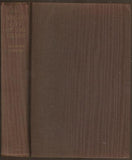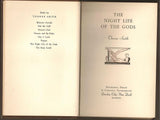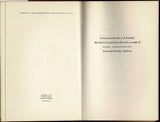The Night Life of the Gods
Author: Thorne Smith (1892-1934)
Year: 1931
Publisher: Doubleday, Doran and Company
Place: New York
Description:
311 pages with illustrations. Small octavo (7 3/4" x 5 1/2") bound in original publisher's brown cloth with pictorial jacket. First edition.
Hunter Hawk has a knack for annoying his ultra-respectable relatives. He likes to experiment and, best of all, he likes to experiment with explosives. His garage-cum-laboratory is a veritable mine field replete with noxious fumes. But with the help of Megaera, a fetching 900-year-old lady leprechaun he meets one night in the woods, he masters the art (if not the timing) of transforming people into statues and statues into people. And when he practices his new witchery in the stately halls of the Metropolitan Museum of Art -- setting Bacchus, Mercury, Neptune, Diane, Hebe, Apollo, and Perseus loose on the unsuspecting citizenry of Prohibition-era New York -- the stage is set for Thorne Smith at his most devilish and delightful.
In March 1934 Carl Laemmle, Jr. purchased the rights to Thorne Smith's popular 1931 humorous fantasy Night Life of the Gods. While the plot remained essentially the same, the sexual humor was vitiated by Code considerations. The ending, too, was changed by adding the "it was only a dream" device. At first, Lowell Sherman himself was considered for the lead role, but he suffered from laryngitis and lost his voice. Also considered for the role of Hunter Hawk was Edward Everett Horton, but Mowbray was signed in July. A well-known character actor throughout his career, this was one of Mowbray's few leading roles. Among the actors portraying gods, "Crash" Corrigan appears as Apollo (credited as Raymond Benard). Pat DiCicco made his only known screen appearance as Perseus (credited as Pat De Cicco); DiCicco was better known as a powerful Hollywood agent and for his brief, troubled marriage to Thelma Todd. The film was released nationally March 11, 1935. In general it received mixed reviews, some critics finding it funny in parts but drawing an unfavorable comparison to the popular novel. New York Times critic Andre Sennwald found it only "moderately entertaining", but noted that the production was at a disadvantage because of the "current cinema morality".
Condition:
Some rubbing and sunning to binding, some foxing to end-leaves, some intermittent foxing in text. Jacket later printing stated 8th edition. spine toned, chipped, and soiled, some soiling and wear to jacket panels, cloth spine a bit dull, else a better than very good copy in like jacket. jacket.















